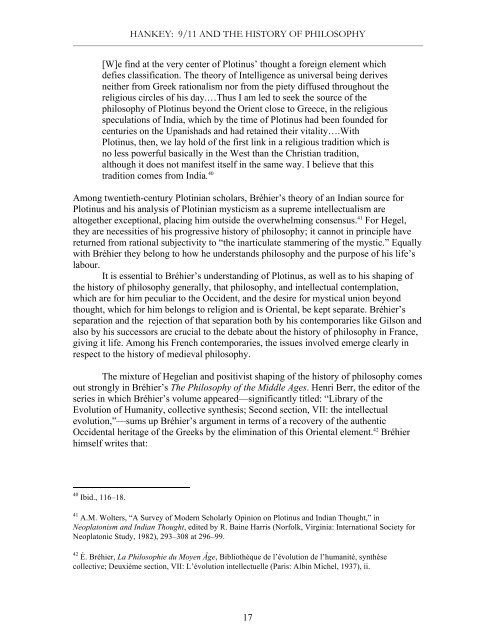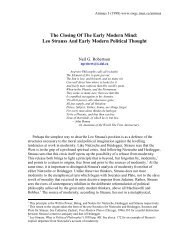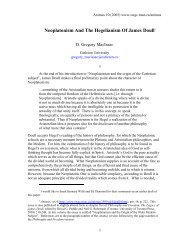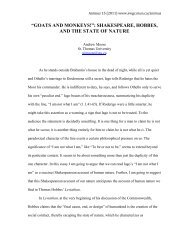Wayne Hankey, 9/11 and the History of Philosophy - Memorial ...
Wayne Hankey, 9/11 and the History of Philosophy - Memorial ...
Wayne Hankey, 9/11 and the History of Philosophy - Memorial ...
You also want an ePaper? Increase the reach of your titles
YUMPU automatically turns print PDFs into web optimized ePapers that Google loves.
HANKEY: 9/<strong>11</strong> AND THE HISTORY OF PHILOSOPHY[W]e find at <strong>the</strong> very center <strong>of</strong> Plotinus’ thought a foreign element whichdefies classification. The <strong>the</strong>ory <strong>of</strong> Intelligence as universal being derivesnei<strong>the</strong>r from Greek rationalism nor from <strong>the</strong> piety diffused throughout <strong>the</strong>religious circles <strong>of</strong> his day.…Thus I am led to seek <strong>the</strong> source <strong>of</strong> <strong>the</strong>philosophy <strong>of</strong> Plotinus beyond <strong>the</strong> Orient close to Greece, in <strong>the</strong> religiousspeculations <strong>of</strong> India, which by <strong>the</strong> time <strong>of</strong> Plotinus had been founded forcenturies on <strong>the</strong> Upanishads <strong>and</strong> had retained <strong>the</strong>ir vitality….WithPlotinus, <strong>the</strong>n, we lay hold <strong>of</strong> <strong>the</strong> first link in a religious tradition which isno less powerful basically in <strong>the</strong> West than <strong>the</strong> Christian tradition,although it does not manifest itself in <strong>the</strong> same way. I believe that thistradition comes from India. 40Among twentieth-century Plotinian scholars, Bréhier’s <strong>the</strong>ory <strong>of</strong> an Indian source forPlotinus <strong>and</strong> his analysis <strong>of</strong> Plotinian mysticism as a supreme intellectualism arealtoge<strong>the</strong>r exceptional, placing him outside <strong>the</strong> overwhelming consensus. 41 For Hegel,<strong>the</strong>y are necessities <strong>of</strong> his progressive history <strong>of</strong> philosophy; it cannot in principle havereturned from rational subjectivity to “<strong>the</strong> inarticulate stammering <strong>of</strong> <strong>the</strong> mystic.” Equallywith Bréhier <strong>the</strong>y belong to how he underst<strong>and</strong>s philosophy <strong>and</strong> <strong>the</strong> purpose <strong>of</strong> his life’slabour.It is essential to Bréhier’s underst<strong>and</strong>ing <strong>of</strong> Plotinus, as well as to his shaping <strong>of</strong><strong>the</strong> history <strong>of</strong> philosophy generally, that philosophy, <strong>and</strong> intellectual contemplation,which are for him peculiar to <strong>the</strong> Occident, <strong>and</strong> <strong>the</strong> desire for mystical union beyondthought, which for him belongs to religion <strong>and</strong> is Oriental, be kept separate. Bréhier’sseparation <strong>and</strong> <strong>the</strong> rejection <strong>of</strong> that separation both by his contemporaries like Gilson <strong>and</strong>also by his successors are crucial to <strong>the</strong> debate about <strong>the</strong> history <strong>of</strong> philosophy in France,giving it life. Among his French contemporaries, <strong>the</strong> issues involved emerge clearly inrespect to <strong>the</strong> history <strong>of</strong> medieval philosophy.The mixture <strong>of</strong> Hegelian <strong>and</strong> positivist shaping <strong>of</strong> <strong>the</strong> history <strong>of</strong> philosophy comesout strongly in Bréhier’s The <strong>Philosophy</strong> <strong>of</strong> <strong>the</strong> Middle Ages. Henri Berr, <strong>the</strong> editor <strong>of</strong> <strong>the</strong>series in which Bréhier’s volume appeared—significantly titled: “Library <strong>of</strong> <strong>the</strong>Evolution <strong>of</strong> Humanity, collective syn<strong>the</strong>sis; Second section, VII: <strong>the</strong> intellectualevolution,”—sums up Bréhier’s argument in terms <strong>of</strong> a recovery <strong>of</strong> <strong>the</strong> au<strong>the</strong>nticOccidental heritage <strong>of</strong> <strong>the</strong> Greeks by <strong>the</strong> elimination <strong>of</strong> this Oriental element. 42 Bréhierhimself writes that:40 Ibid., <strong>11</strong>6–18.41 A.M. Wolters, “A Survey <strong>of</strong> Modern Scholarly Opinion on Plotinus <strong>and</strong> Indian Thought,” inNeoplatonism <strong>and</strong> Indian Thought, edited by R. Baine Harris (Norfolk, Virginia: International Society forNeoplatonic Study, 1982), 293–308 at 296–99.42 É. Bréhier, La Philosophie du Moyen Âge, Bibliothèque de l’évolution de l’humanité, synthèsecollective; Deuxième section, VII: L’évolution intellectuelle (Paris: Albin Michel, 1937), ii.17
















